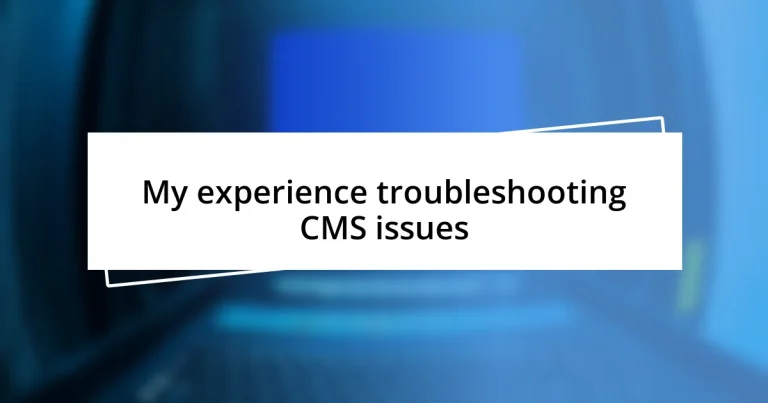Key takeaways:
- Methodical troubleshooting is essential: Identifying issues, reviewing recent changes, and checking server status can lead to effective solutions.
- Having the right tools, such as error logging and a staging environment, significantly eases the troubleshooting process and reduces stress during critical moments.
- Continuous learning through experiences and documentation helps improve CMS management and fosters a supportive community through shared knowledge and insights.
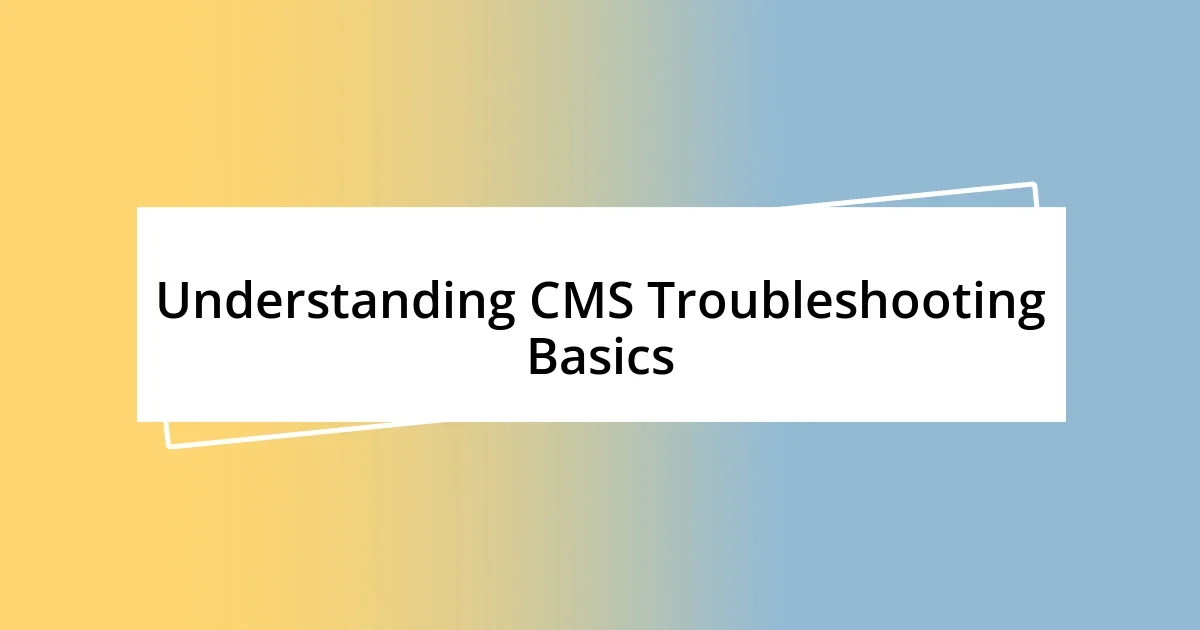
Understanding CMS Troubleshooting Basics
When I first dove into content management systems (CMS), I quickly realized that troubleshooting was an inevitable part of the journey. I remember the panic I felt when a plugin update caused my site to crash—talk about a heart-dropping moment! Understanding the basics of CMS troubleshooting involves familiarizing yourself with common issues, such as broken links, slow loading times, or formatting errors.
It’s essential to approach CMS issues methodically. I often ask myself questions like, “What changed just before the issue appeared?” This kind of inquiry helps me pinpoint the root cause, whether it’s a recent update or a misplaced setting. I recall a situation where an issue seemed complex at first, but simply clearing my cache made everything function again.
What’s truly fascinating about troubleshooting is how it can be a learning curve. Each problem teaches you something new about your CMS and empowers you for future challenges. For me, those small victories—fixing a bug or restoring a feature—always bring a sense of accomplishment that fuels my enthusiasm for creating and managing content.
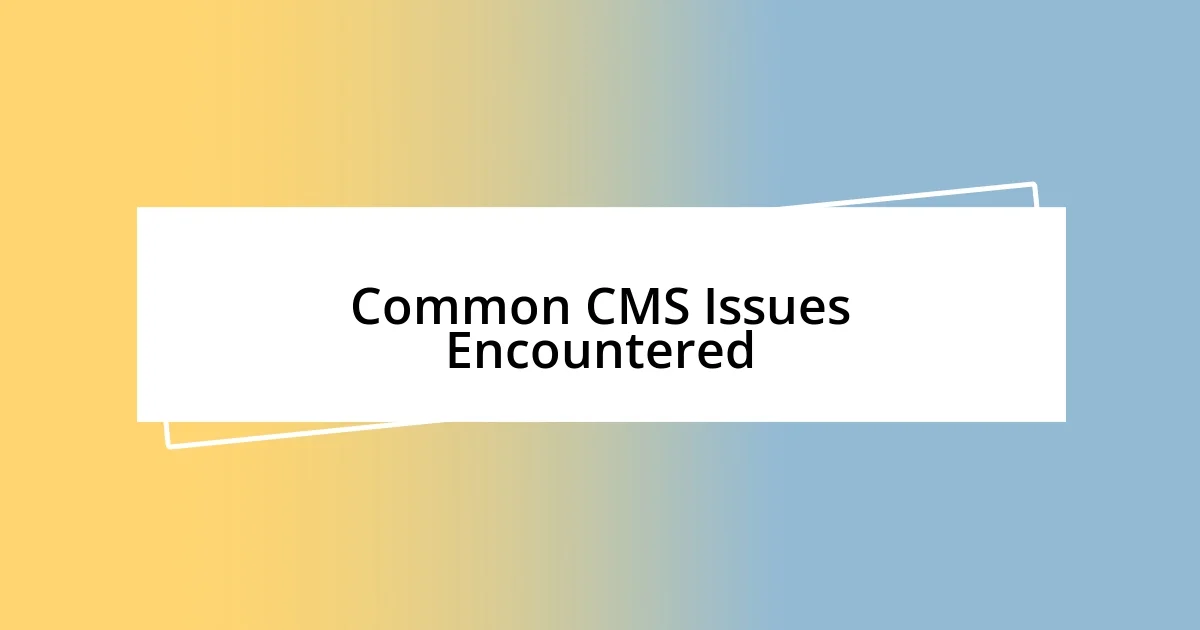
Common CMS Issues Encountered
When navigating a CMS, one of the most frustrating issues I often face is when the site suddenly goes offline. I remember a time when an unexpected server issue made my website inaccessible during a high-traffic event. The anxiety I felt was palpable, and I learned the hard way the importance of regular backups and having a reliable hosting provider.
Another common issue that has tested my patience is broken links. It’s amazing how a few broken links can impact user experience and SEO! I recall spending hours tracking down these pesky issues, only to discover they stemmed from a simple URL change. Each of these experiences has made me appreciate the necessity of routine checks and the use of tools to identify and fix broken links proactively.
Let’s not forget about compatibility issues, particularly between themes and plugins. I’ve run into situations where a new theme didn’t play well with my existing plugins, leading to a baffling mix of errors. It always feels like a puzzle, trying to figure out the best combination. In one instance, after a particularly long troubleshooting session, I found that simply updating the plugins resolved the conflict, ending what felt like an endless cycle of trial and error.
| Common Issue | Example Reaction |
|---|---|
| Site Goes Offline | Anxiety during high traffic events |
| Broken Links | Hours spent fixing simple URL changes |
| Compatibility Issues | Trial and error with plugins and themes |
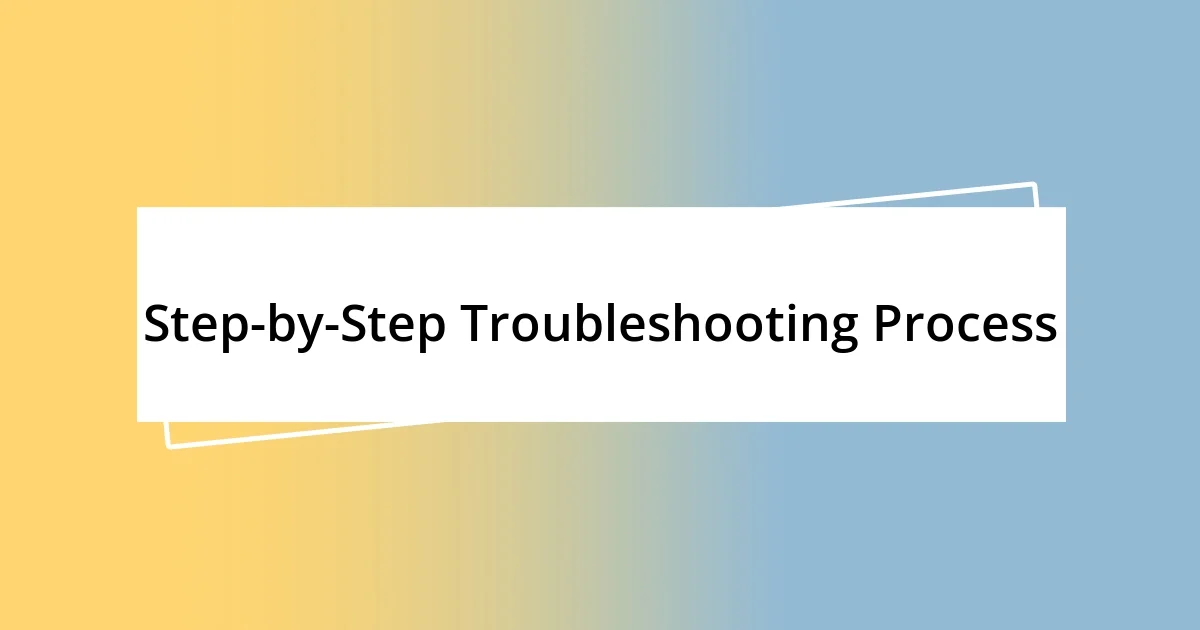
Step-by-Step Troubleshooting Process
Troubleshooting CMS issues is all about taking a logical approach. When I run into a problem, I follow a series of clear steps to uncover the root cause. It’s almost like solving a mystery, where each clue leads me a bit closer to the solution. I remember a particularly frustrating day when my images wouldn’t load. By breaking down the problem systematically—checking file paths, permissions, and ultimately, browser settings—I realized how effective a methodical approach can be.
Here’s a step-by-step troubleshooting process that I find useful:
- Identify the Issue: Document what’s happening in detail—the symptoms, timing, and frequency.
- Review Recent Changes: Consider any updates or changes made right before the problem arose, as that’s often where the answer lies.
- Check Server Status: Ensure that your hosting server is up and running. Sometimes, the issue is out of our hands.
- Clear Cache: Don’t underestimate the power of a good cache clear—it can resolve many issues quickly.
- Disable Plugins/Themes: Temporarily deactivate plugins or switch themes to isolate potential conflicts.
Continuing with this troubleshooting mindset, I find that persistence often pays off. One time, on a busy launch day, a last-minute error in my content formatting left me scrambling. Instead of panicking, I went through each element step-by-step to locate the errant tag. When I finally discovered the cause, it felt like a light bulb moment—my sight was back to normal, and I could breathe again. It’s these methodical steps that transform daunting hurdles into manageable tasks.
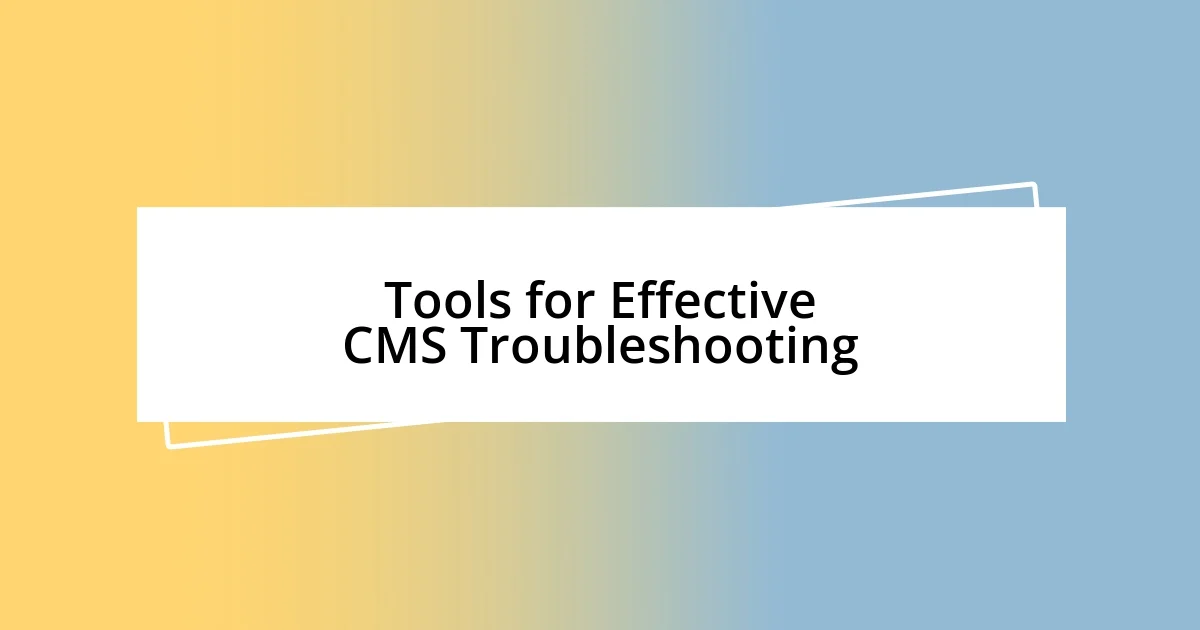
Tools for Effective CMS Troubleshooting
When it comes to troubleshooting CMS issues, having the right tools can make all the difference. One resource I heavily rely on is an integrated error logging tool. This feature saves me countless hours of frustration. I recall a time when a mysterious error message kept surfacing, and instead of sifting through lines of code, I glanced at the logs. They pinpointed the exact line causing the trouble, turning what could have been a stressful day into a simple fix.
Another indispensable tool is the functionality of a staging environment. This is where I indulge in risk-free experimentation. For instance, I once launched a new feature on my site and inadvertently broke some existing functionality. If I hadn’t tested everything in a staging environment first, I can only imagine the chaos that would’ve ensued—users complaining, traffic dropping. It’s a game-changer for ensuring updates are seamless and calculated.
Lastly, let’s not underestimate the power of browser developer tools. They can reveal a treasure trove of information about how my pages are behaving. I remember being utterly stumped when one of my custom scripts wasn’t running. A quick glance at the Console tab revealed a syntax error I had overlooked. Despite feeling a jolt of panic, that discovery felt like finding the last piece of a jigsaw puzzle. Without these tools, I would have spent far longer unraveling that mystery. Have you ever experienced such a moment with your own CMS? It’s in those little triumphs that the journey becomes worth it.
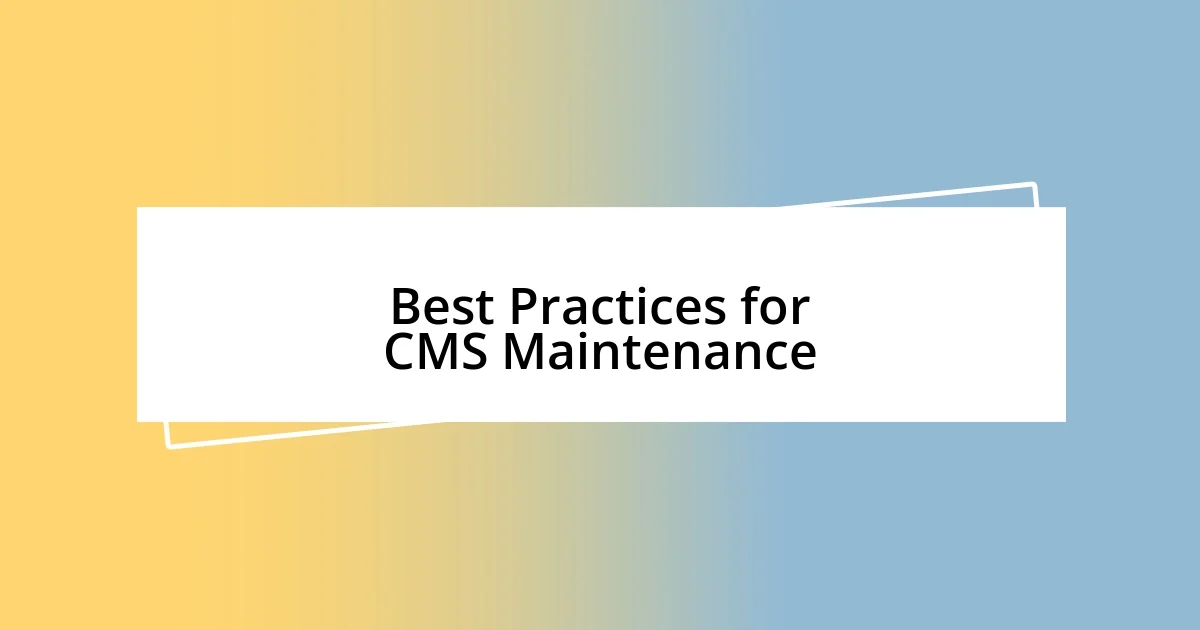
Best Practices for CMS Maintenance
Maintaining a CMS is more straightforward when you adhere to a schedule. Personally, I set aside regular intervals for updates, backups, and security checks. This practice not only helps me stay organized but also prevents minor issues from snowballing into larger dilemmas. Have you ever considered the peace of mind that comes from knowing your site is consistently maintained? It feels like having a well-oiled machine ready for anything.
Engaging with the community can be another valuable practice I’ve found. Participating in forums and groups has connected me with others facing similar issues. For example, I once shared a problem regarding a buggy plugin and discovered several users had already documented solutions. It’s like having a vast library of collective knowledge at your fingertips. When’s the last time you asked for help or shared your expertise? It could save you a lot of time.
Lastly, documenting my maintenance efforts is something I can’t stress enough. Recording details about what I’ve updated, issues encountered, and resolutions found helps me track patterns over time. I distinctively remember a situation where a particular update consistently caused a conflict with my theme. By referring back to my notes, I was able to apply a workaround swiftly. How might documenting your own processes simplify your troubleshooting in the future? Keeping a detailed log can transform your approach to CMS maintenance, making it more efficient and less stressful.

Learning from Troubleshooting Experiences
Learning from troubleshooting experiences is something I find invaluable. Each time I encounter an issue, I try to extract a lesson from it, transforming frustration into growth. I remember a particularly challenging day when an update caused my entire site to crash. I felt an overwhelming wave of panic wash over me. However, by dissecting that experience later, I learned the importance of running a backup before applying significant changes. Have you ever felt that sinking feeling followed by the realization that there’s always a lesson to be learned?
One key insight I gleaned is the necessity of patience. I once wrestled with a persistent 404 error that seemed to have no end in sight. After hours of troubleshooting, I took a break, allowing my mind to reset. Surprisingly, when I returned, I spotted a minor oversight—an incorrect permalink setting. That breakthrough not only relieved my stress but reminded me that sometimes stepping away can lead to clarity. Have you ever found that a little distance allows you to see things from a new perspective?
Documenting these experiences has become a ritual for me. After resolving an issue, I take a moment to jot down what happened, how I approached it, and what I learned. I distinctly recall a mystery involving user permissions that spanned multiple headaches. By keeping a record, I could trace back my steps and identify the misconfigured settings. That documentation not only helps me navigate similar problems in the future but also offers a path to share my experiences with others. Have you ever shared a workaround with someone who really needed it? There’s something profoundly satisfying about turning troubleshooting trials into shared wisdom.
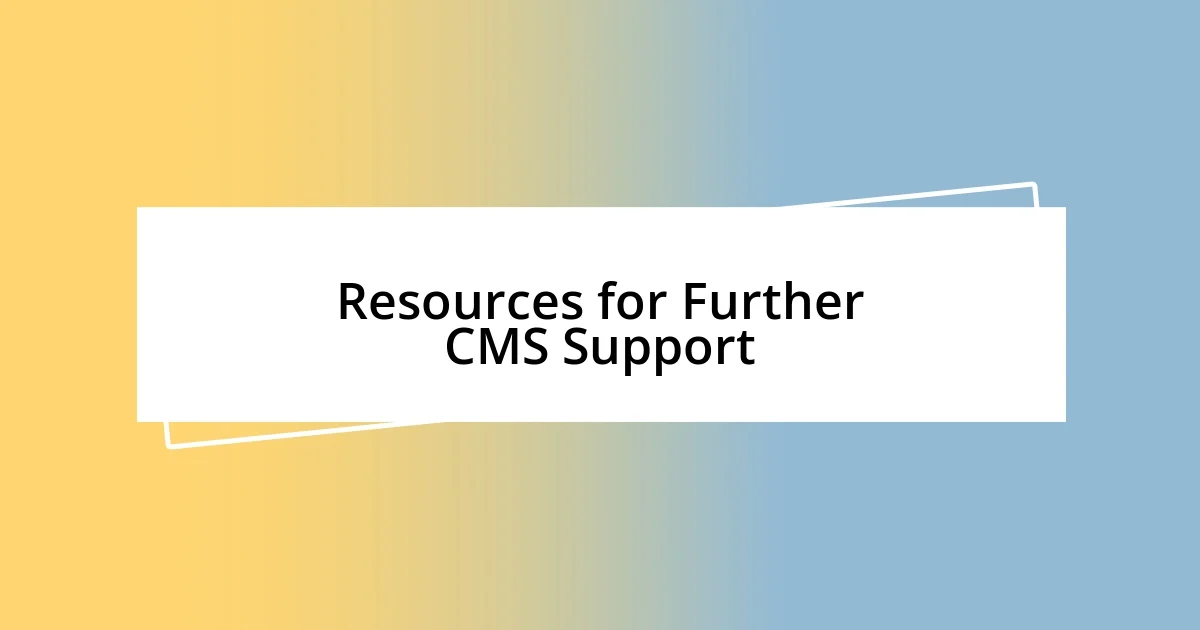
Resources for Further CMS Support
Sometimes, the best resources for CMS support can be found right at your fingertips. I’ve leaned heavily on official documentation and forums related to my CMS, such as WordPress Codex or Drupal’s community pages. When I faced a persistent issue with a plugin conflict, those resources were my lifeline. I remember diving into the depth of the documentation and, while it felt overwhelming at first, it ultimately led me to a specific line of code that resolved the conflict. Have you ever explored your CMS’s documentation? It’s like having a treasure map pointing you in the right direction.
You might also consider tapping into video tutorials on platforms like YouTube or educational websites. I often find visuals make complex processes much clearer. Not long ago, I struggled with customizing my site’s layout, so I searched for a tutorial that walked me through the process step by step. Watching someone navigate the software not only made me understand it better but also gave me a confidence boost. Have you ever watched a tutorial that felt like a helping hand guiding you through a complicated process?
Finally, don’t underestimate the power of local meetups or online webinars for CMS users. Attending these sessions has enriched my understanding manifold. I recall attending a local WordPress meetup where not only did I learn about new themes, but I also connected with other users who shared their troubleshooting stories and tricks. It felt remarkable to be in a room full of people who understood the challenges we all face. Have you ever participated in a community event? Those interactions can spark insights and inspire solutions you never considered before.











